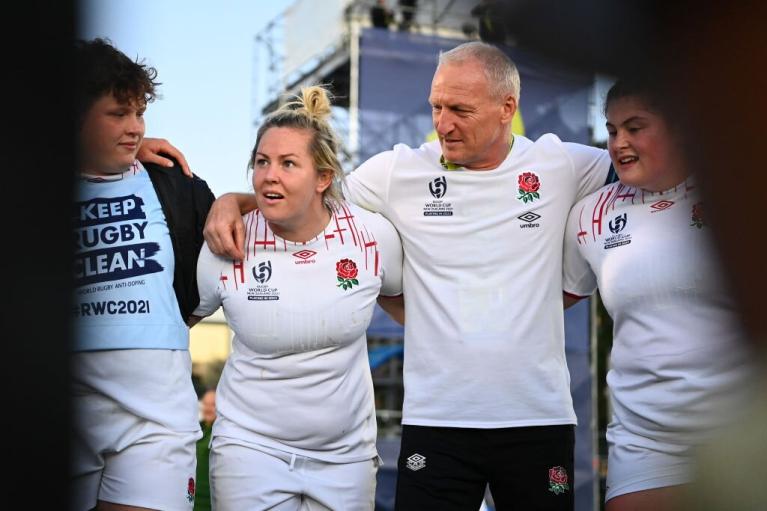'Barring a gargantuan upset, the Red Roses will comfortably beat the Black Ferns'

At least we know that World Rugby’s algorithm is working as it should. The top two teams on the women’s circuit, according to the governing body’s metrics are England and New Zealand. The two teams competing in the final of the World Cup this weekend are England and New Zealand.
Barring a gargantuan upset, the Red Roses will comfortably beat the Black Ferns in the tournament’s showpiece game which would extend their unbeaten run to 31 matches. Don't worry if you miss the action. We know how this is going to end.
Sport loses something when we can accurately predict what's coming. Take away the uncertainty and you’re left with a product that more resembles a West End theatre production or a live music set. That is not to say that the cast of Hamilton or the members of Wet Leg don’t put on a show. But when you can confidently sing along to the tunes, you lose a little bit of the magic. Eventually even the most thrilling performance can feel stale.
This has been a watershed event for women’s rugby. There has never been more eyes on the sport. Commentators and columnists (present company included) are engaging in ways that they simply never did before. That does not mean that we cannot cast a critical eye on particular aspects that could do with improvement.
Whatever your view on Ruby Tui’s sidestep or Marjorie Mayans’ work at the breakdown, however long you’ve been a champion of the forgotten half of rugby union, there is no denying that England’s third title will come as no surprise when it happens.
But here’s the thing. Even though the next week will stick tightly to an almost predetermined narrative, anything other than a resounding victory for Simon Middleton’s side would be to the detriment of the women’s game as a whole. In order to ensure that the next World Cup and those that come after are less formulaic than this one, England must sweep aside their rivals and ascend as the undisputed leaders in their field.
The RFU have a lot to answer for. Rugby union in the country is still riddled with class inequality. Two teams in the ring-fenced Premiership have just gone belly-up, leaving hundreds of good people unemployed. Fans in Twickenham Stadium continue to sing a song linked with the slave trade despite one of England's leading black players asking for this to end. Just this week, those in power have stated that they will raise the costs of already exorbitantly priced tickets during a crippling economic crisis.
But even their harshest critics cannot argue against the RFU’s commendable commitment to their women’s team. No other board in the world spends as much money developing the talents of young girls or ensuring that those at the top of their game are treated as professionals. The Premier 15s is the best women’s league in the world and now includes a domestic cup that adds an extra layer of intrigue.
Forget the indomitability of their driving maul or the metronomic control exerted by Emily Scarratt in midfield. An English win would be a testament to the adage that says, “you get out what you put in”.
An England win would send a message to their competitors. “If you want to match us on the field, you have to match us off it”. Any other nation that claims to take women’s rugby seriously will have to put their money where their mouth is.
This might upset fans who cling to the notion that sport shouldn’t be a business. That dash and daring can triumph over pragmatic economics. That’s all well and good in the age of amateurism, but every sport in every country is dominated by institutions with deeper pockets. There are the occasional blips, and sound coaching and talent can often shock the bookies. But over an extended period results bends towards the wealthy.
Besides, don’t we want women rugby players to reap the benefits of a changing ecosystem? I’ve spoken to many players who concurrently hold down a day job to support their rugby habit and not one of them would want to keep the status quo. No one of them has said that they enjoy training immediately after putting in a shift at the office. No one romanticised the idea of nursing a knee strain or a gammy shoulder while hunched over at their desk. Even those with more fulfilling jobs, such as coaches, teachers and engineers would rather devote more time and energy into rugby.
Of course they would. But why would their boards acquiesce to their demands if they then go and win the World Cup? It would be easy for those with their hands on the levers of power to point out that the players are doing just fine without a central contract or business class flights. What would be the use in pouring more money into an already successful programme?
The French, Canadian and New Zealand teams will empty their tanks in the final matches this coming weekend. There is no question that they will continue to represent their countries with honour. But if they are to reach even higher, and raise the ceiling of the women’s game with them, it is imperative that they crash against the white wall of England.
Latest Comments
Perfect.
Now bring back Mo’unga in July 2026.
Go to comments“Can’t transfer that to test rugby.” That sums up Damian McKenzie perfectly in 2024. That is why he lost the starting 10 jersey to a 33 year old.
Go to comments